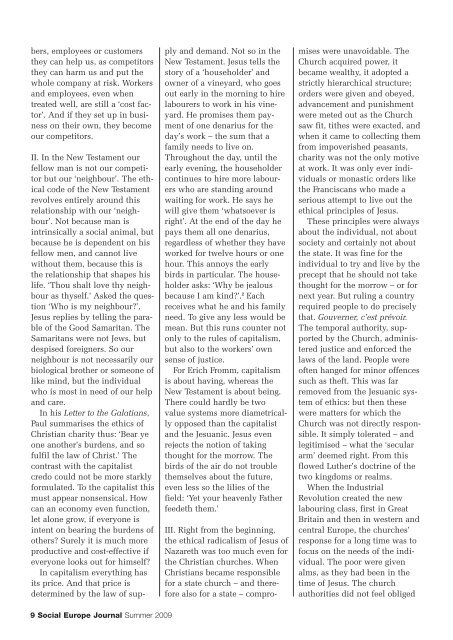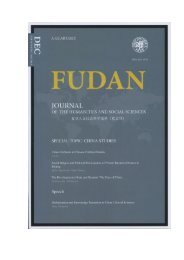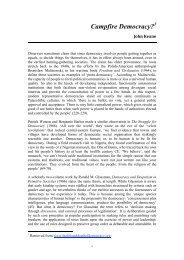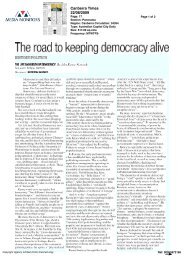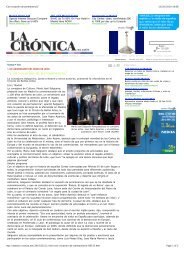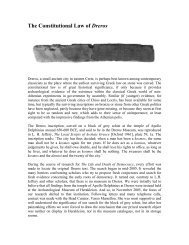The Ethics of Capitalism - Social Europe Journal
The Ethics of Capitalism - Social Europe Journal
The Ethics of Capitalism - Social Europe Journal
Create successful ePaper yourself
Turn your PDF publications into a flip-book with our unique Google optimized e-Paper software.
ers, employees or customers<br />
they can help us, as competitors<br />
they can harm us and put the<br />
whole company at risk. Workers<br />
and employees, even when<br />
treated well, are still a ‘cost factor’.<br />
And if they set up in business<br />
on their own, they become<br />
our competitors.<br />
II. In the New Testament our<br />
fellow man is not our competitor<br />
but our ‘neighbour’. <strong>The</strong> ethical<br />
code <strong>of</strong> the New Testament<br />
revolves entirely around this<br />
relationship with our ‘neighbour’.<br />
Not because man is<br />
intrinsically a social animal, but<br />
because he is dependent on his<br />
fellow men, and cannot live<br />
without them, because this is<br />
the relationship that shapes his<br />
life. ‘Thou shalt love thy neighbour<br />
as thyself.’ Asked the question<br />
‘Who is my neighbour’,<br />
Jesus replies by telling the parable<br />
<strong>of</strong> the Good Samaritan. <strong>The</strong><br />
Samaritans were not Jews, but<br />
despised foreigners. So our<br />
neighbour is not necessarily our<br />
biological brother or someone <strong>of</strong><br />
like mind, but the individual<br />
who is most in need <strong>of</strong> our help<br />
and care.<br />
In his Letter to the Galatians,<br />
Paul summarises the ethics <strong>of</strong><br />
Christian charity thus: ‘Bear ye<br />
one another’s burdens, and so<br />
fulfil the law <strong>of</strong> Christ.’ <strong>The</strong><br />
contrast with the capitalist<br />
credo could not be more starkly<br />
formulated. To the capitalist this<br />
must appear nonsensical. How<br />
can an economy even function,<br />
let alone grow, if everyone is<br />
intent on bearing the burdens <strong>of</strong><br />
others Surely it is much more<br />
productive and cost-effective if<br />
everyone looks out for himself<br />
In capitalism everything has<br />
its price. And that price is<br />
determined by the law <strong>of</strong> sup-<br />
ply and demand. Not so in the<br />
New Testament. Jesus tells the<br />
story <strong>of</strong> a ‘householder’ and<br />
owner <strong>of</strong> a vineyard, who goes<br />
out early in the morning to hire<br />
labourers to work in his vineyard.<br />
He promises them payment<br />
<strong>of</strong> one denarius for the<br />
day’s work – the sum that a<br />
family needs to live on.<br />
Throughout the day, until the<br />
early evening, the householder<br />
continues to hire more labourers<br />
who are standing around<br />
waiting for work. He says he<br />
will give them ‘whatsoever is<br />
right’. At the end <strong>of</strong> the day he<br />
pays them all one denarius,<br />
regardless <strong>of</strong> whether they have<br />
worked for twelve hours or one<br />
hour. This annoys the early<br />
birds in particular. <strong>The</strong> householder<br />
asks: ‘Why be jealous<br />
because I am kind’. 2 Each<br />
receives what he and his family<br />
need. To give any less would be<br />
mean. But this runs counter not<br />
only to the rules <strong>of</strong> capitalism,<br />
but also to the workers’ own<br />
sense <strong>of</strong> justice.<br />
For Erich Fromm, capitalism<br />
is about having, whereas the<br />
New Testament is about being.<br />
<strong>The</strong>re could hardly be two<br />
value systems more diametrically<br />
opposed than the capitalist<br />
and the Jesuanic. Jesus even<br />
rejects the notion <strong>of</strong> taking<br />
thought for the morrow. <strong>The</strong><br />
birds <strong>of</strong> the air do not trouble<br />
themselves about the future,<br />
even less so the lilies <strong>of</strong> the<br />
field: ‘Yet your heavenly Father<br />
feedeth them.’<br />
III. Right from the beginning,<br />
the ethical radicalism <strong>of</strong> Jesus <strong>of</strong><br />
Nazareth was too much even for<br />
the Christian churches. When<br />
Christians became responsible<br />
for a state church – and therefore<br />
also for a state – compro-<br />
mises were unavoidable. <strong>The</strong><br />
Church acquired power, it<br />
became wealthy, it adopted a<br />
strictly hierarchical structure;<br />
orders were given and obeyed,<br />
advancement and punishment<br />
were meted out as the Church<br />
saw fit, tithes were exacted, and<br />
when it came to collecting them<br />
from impoverished peasants,<br />
charity was not the only motive<br />
at work. It was only ever individuals<br />
or monastic orders like<br />
the Franciscans who made a<br />
serious attempt to live out the<br />
ethical principles <strong>of</strong> Jesus.<br />
<strong>The</strong>se principles were always<br />
about the individual, not about<br />
society and certainly not about<br />
the state. It was fine for the<br />
individual to try and live by the<br />
precept that he should not take<br />
thought for the morrow – or for<br />
next year. But ruling a country<br />
required people to do precisely<br />
that. Gouverner, c’est prévoir.<br />
<strong>The</strong> temporal authority, supported<br />
by the Church, administered<br />
justice and enforced the<br />
laws <strong>of</strong> the land. People were<br />
<strong>of</strong>ten hanged for minor <strong>of</strong>fences<br />
such as theft. This was far<br />
removed from the Jesuanic system<br />
<strong>of</strong> ethics: but then these<br />
were matters for which the<br />
Church was not directly responsible.<br />
It simply tolerated – and<br />
legitimised – what the ‘secular<br />
arm’ deemed right. From this<br />
flowed Luther’s doctrine <strong>of</strong> the<br />
two kingdoms or realms.<br />
When the Industrial<br />
Revolution created the new<br />
labouring class, first in Great<br />
Britain and then in western and<br />
central <strong>Europe</strong>, the churches’<br />
response for a long time was to<br />
focus on the needs <strong>of</strong> the individual.<br />
<strong>The</strong> poor were given<br />
alms, as they had been in the<br />
time <strong>of</strong> Jesus. <strong>The</strong> church<br />
authorities did not feel obliged<br />
9 <strong>Social</strong> <strong>Europe</strong> <strong>Journal</strong> Summer 2009


